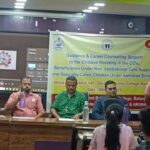India, Russia highlight need for keeping bilateral economic contacts ‘stable, predictable’
NEW DELHI,APRIL 2: India and Russia on Friday emphasised the need for keeping bilateral economic, technological and people-to-people contacts “stable and predictable”, signalling an intent to carry on with their cooperation, notwithstanding western sanctions on Moscow.
External Affairs Minister S Jaishankar and his visiting Russian counterpart Sergey Lavrov held wide-ranging talks, covering various aspects of the bilateral ties including trade and investment, a day after the US warned of consequences for countries for any attempt to “circumvent” the American sanctions against Moscow.
Following the talks, Lavrov called on Prime Minister Narendra Modi.
Hours before the Russian foreign minister landed in India, US Deputy National Security Adviser Daleep Singh cautioned that there will be consequences for countries actively attempting to “circumvent or backfill” the American sanctions against Moscow.
Referring to the crisis in Ukraine, Jaishankar, in the talks, emphasised the importance of cessation of violence and ending hostilities, and noted that differences and disputes should be resolved through dialogue and diplomacy.
“The ministers assessed the overall state of cooperation. They considered the implications of recent developments on trade and economic relations,” the Ministry of External Affairs (MEA) said in a statement.
It said Jaishankar underlined that as a developing economy, global volatility in different domains is of particular concern to India.
“It is important for both countries that their economic, technological and people to people contacts remain stable and predictable,” it said in a statement.
The MEA said the two sides discussed developments pertaining to Ukraine and Lavrov briefed the Indian side on the Russian perspective of the situation, including the ongoing peace talks.
“The external affairs minister emphasised the importance of cessation of violence and ending hostilities. Differences and disputes should be resolved through dialogue and diplomacy and by respect for international law, UN Charter, sovereignty and territorial integrity of states,” it added.
The high-level talks took place in the backdrop of indications that India could buy greater volumes of discounted Russian oil and both sides were keen on having a ruble-rupee arrangement for bilateral trade.
The two sides also discussed the situation in Afghanistan and Lavrov conveyed his assessment of a recent conference on the war-torn country in China.
“Concluded talks with Russian Foreign Minister Sergey Lavrov. Discussed bilateral cooperation and developments in Ukraine, Afghanistan, Iran, Indo-Pacific, ASEAN and the Indian sub-continent,” Jaishankar said in a tweet.
In his opening remarks at the talks, the external affairs minister said keeping regular touch between the two sides is something “that is in our mutual interest”.
“Our meeting today takes place in a difficult international environment quite apart from the pandemic. India, as you are aware, has always been in favour of resolving differences and disputes through dialogue and diplomacy,” he said.
On his part, Lavrov said the ties between India and Russia were “very sustainable” during many “difficult times” in the past and that he did not have the slightest of doubts about continued cooperation.
He said strengthening of ties with India has been a key priority of the Russian foreign policy.
“We are interested in having a balanced world order, which makes it sustainable,” Lavrov said.
“These days, our western colleagues would like to reduce any meaningful international issue to the crisis in Ukraine…. We do not fight anything and we appreciate that India is taking this situation in the entirety of effect and not just in a one-sided way,” he added.
In the talks, Jaishankar noted that the UN Security Council Resolution 2593 expressed the concerns of the international community and spoke of humanitarian support for the Afghan people.
The UNSC resolution, adopted on August 30, 2021 under India’s presidency of the global body, talked about the need for upholding human rights in Afghanistan, demanded that Afghan territory should not be used for terrorism and that a negotiated political settlement to the crisis should be found out.
“Iran and JCPoA (Joint Comprehensive Plan of Action) issue also featured in the talks. The external affairs minister welcomed the Russian briefing on the matter,” the MEA said.
The JCPoA is a pact finalised in 2015 between Iran and several world powers, including the European Union (EU). It was aimed at curbing Iran’s nuclear ambitions. The US had withdrawn from the deal in May 2018. There have been fresh efforts now to restore the deal.
-PTI





